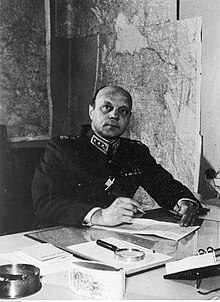Axel Heinrichs
| Erik Heinrichs | |
|---|---|

Army's commander-in-chief Axel Erik Heinrichs
|
|
| Born |
21 July 1890 Helsinki, Finland |
| Died | 16 November 1965 (aged 75) Helsinki, Finland |
| Allegiance |
|
| Service/branch |
Imperial German Army White Guard Finnish Army |
| Years of service | 1915–1945 |
| Rank | Lieutenant General |
| Commands held |
III Corps Army of the Isthmus Army of Karelia Chief of Defence |
| Battles/wars |
First World War Finnish Civil War Winter War Continuation War |
| Awards |
Mannerheim Cross 1st class Knight's Cross of the Iron Cross |
Axel Erik Heinrichs (21 July 1890 – 16 November 1965) was a Finnish military general. He was Finland's Chief of the General Staff during the Interim Peace and Continuation War (1940–1941 and 1942–1944) and commander-in-chief for a short time after the war (1944–1945).
Heinrichs was one of the Finnish Jaeger troops trained in the volunteer Royal Prussian 27th Jäger Battalion between 1915 and 1918. During the Finnish Civil War he served as a battalion commander in the battles of Tampere and Viipuri. He commanded the III Corps in the Winter War and from February 19, 1940 the Army of the Isthmus. He was made Chief of the General Staff in June 1940 and promoted to General of Infantry in 1941.
During the Continuation War he commanded the Army of Karelia until January 1942, after which he was again appointed the Chief of the General Staff. After the war he served as the Army's commander-in-chief but was forced to resign because of the Weapons Cache Case.
In 1944 Heinrichs became the second person to receive the Mannerheim Cross, First Class. He was also a recipient of the Knight's Cross of the Iron Cross (German: Ritterkreuz des Eisernen Kreuzes). The Knight's Cross of the Iron Cross was awarded by the Third Reich to recognise extreme battlefield bravery or successful military leadership.
Heinrichs was one of the military experts of the delegation sent by president Paasikivi to Moscow for the Agreement of Friendship, Cooperation, and Mutual Assistance in 1948.
...
Wikipedia
